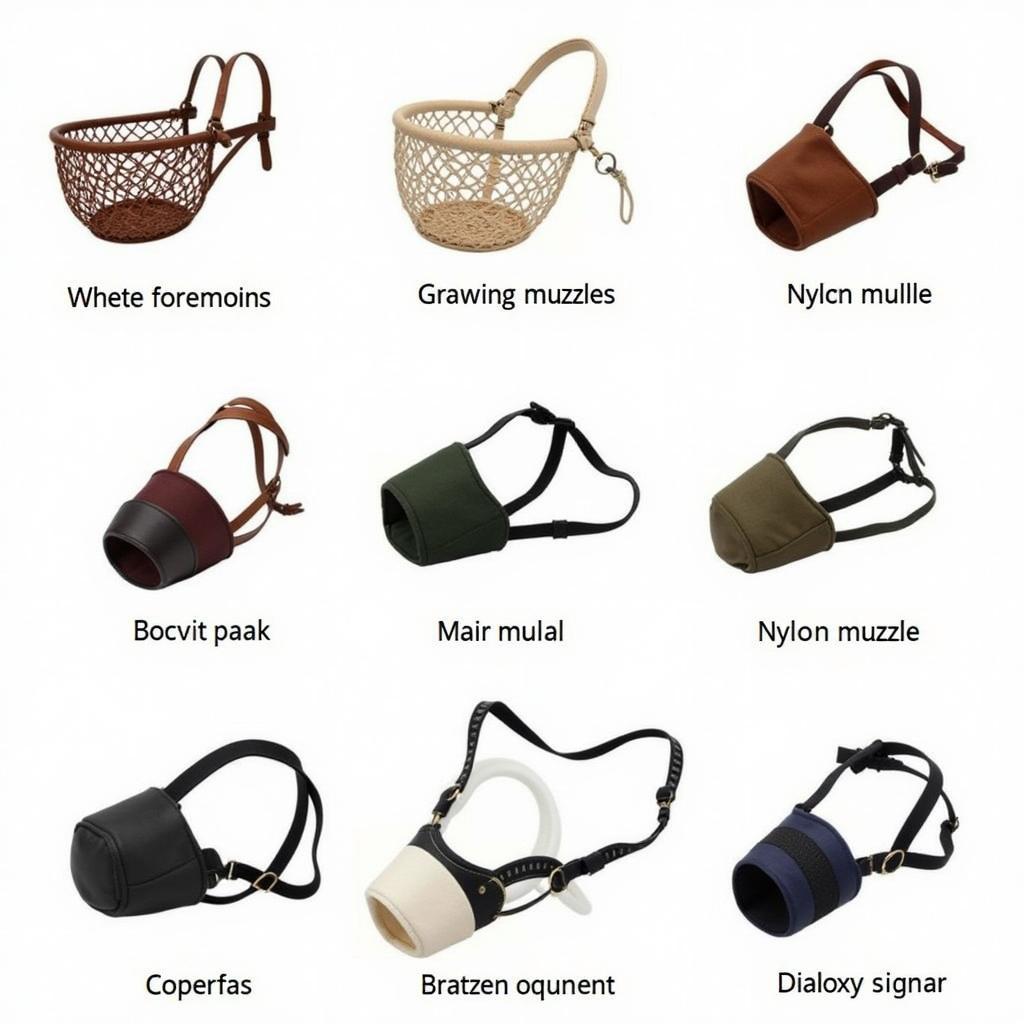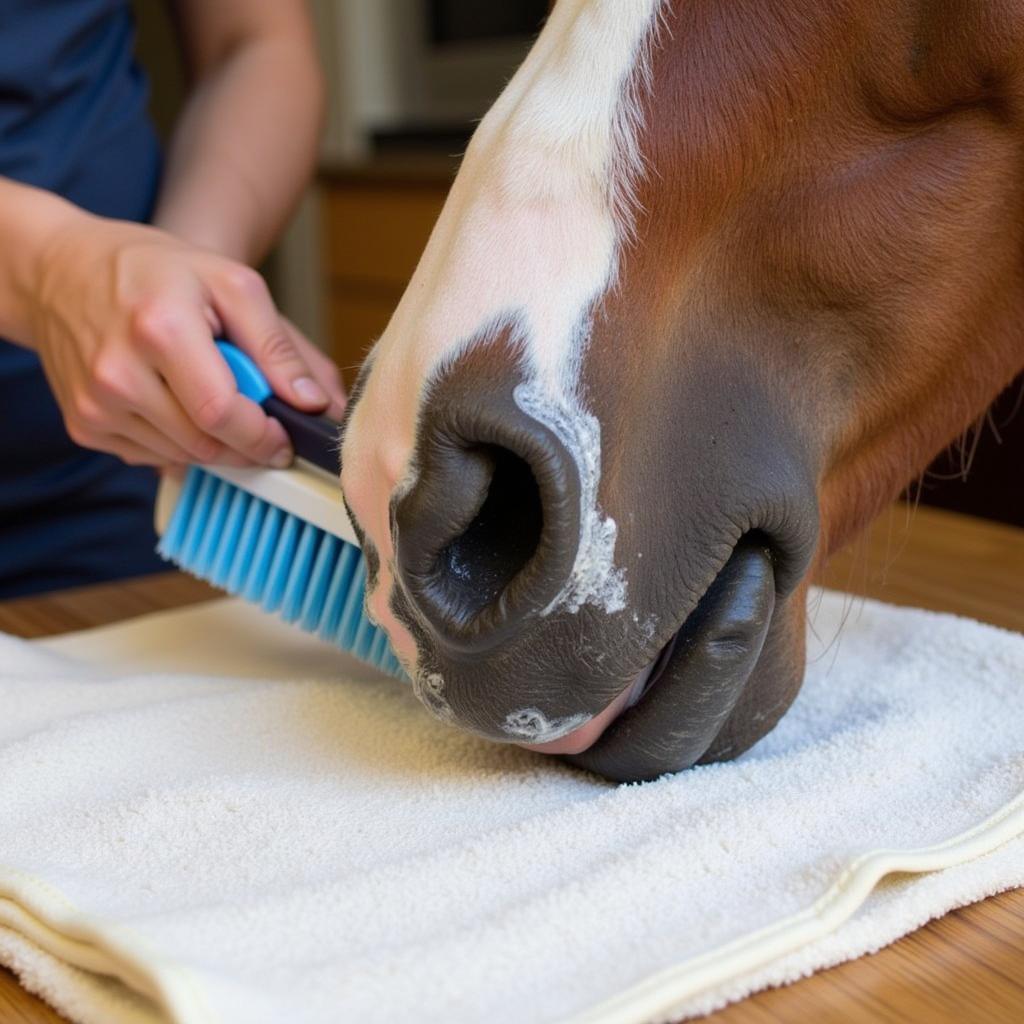A Horse Biting Muzzle is a tool used to prevent horses from biting themselves, other horses, or people. It’s important to understand the reasons behind biting behavior and choose the right muzzle for your horse’s safety and comfort. Let’s dive into the world of horse biting muzzles and discover how to use them effectively.
Why Use a Horse Biting Muzzle?
Horses can bite for various reasons, including aggression, boredom, pain, and even learned behavior. A biting muzzle can be a valuable tool in managing these behaviors, especially when they pose a risk to the horse or others. It’s crucial to remember that a muzzle is a management tool, not a solution. Addressing the underlying cause of the biting is key to long-term success. Sometimes, a horse might need a miniature horse muzzle depending on its size.
Different Types of Horse Biting Muzzles
Several types of muzzles cater to different needs. Grazing muzzles, for instance, allow limited grazing while preventing biting. These are often used for horses prone to overeating or suffering from metabolic conditions. Another option is the basket muzzle, which offers more ventilation and allows the horse to drink and eat small amounts of food. Choosing the right muzzle depends on the individual horse and the specific situation.
What if your horse needs protection from the sun and insects as well as biting prevention? A uv horse mask could be an excellent solution. These masks combine the benefits of a muzzle with added protection against harmful UV rays and pesky insects.
Choosing the Right Horse Biting Muzzle
Selecting the appropriate horse biting muzzle involves considering several factors, including the horse’s size and breed, the reason for the muzzle, and the intended duration of use. A properly fitted muzzle should be snug but not tight, allowing the horse to breathe comfortably and, in some cases, drink.  Various horse muzzles for different purposes
Various horse muzzles for different purposes
When is a Horse Biting Muzzle Necessary?
Situations where a horse biting muzzle might be necessary include:
- Aggressive behavior: To prevent injury to other horses or humans.
- Self-mutilation: To stop a horse from biting or chewing on itself.
- Overgrazing: To manage weight and prevent laminitis.
- Veterinary procedures: To protect the vet and handlers.
- Transport: To prevent injury during travel.
“A properly fitted muzzle is essential for both the horse’s safety and comfort,” says Dr. Emily Carter, equine veterinarian. “It’s crucial to observe the horse regularly while wearing a muzzle to ensure it’s not causing any distress or rubbing.”
How to Introduce a Horse Biting Muzzle
Introducing a horse biting muzzle should be a gradual process. Start by allowing the horse to sniff and investigate the muzzle. Then, try briefly placing the muzzle on the horse’s nose for a few seconds, gradually increasing the duration. Rewarding the horse with positive reinforcement, such as treats or praise, can help create a positive association with the muzzle.
A face mask for horses can offer similar protection and can be a good stepping stone to introducing a muzzle.
Caring for Your Horse’s Muzzle
Regular cleaning is essential to prevent bacteria buildup and skin irritation. Follow the manufacturer’s instructions for cleaning and disinfecting the muzzle. Inspect the muzzle regularly for wear and tear and replace it as needed.
“Regularly checking the fit of the muzzle is vital, especially as the horse grows or changes shape,” advises John Miller, a seasoned horse trainer. “A loose muzzle can be ineffective, while a tight muzzle can cause discomfort and even injury.”  Cleaning a horse muzzle with appropriate cleaning solutions
Cleaning a horse muzzle with appropriate cleaning solutions
Conclusion
A horse biting muzzle can be a valuable tool for managing unwanted biting behavior. By understanding the reasons behind biting, choosing the right muzzle, and introducing it gradually, you can ensure the safety and comfort of your horse and those around it. Remember, addressing the root cause of the biting is essential for long-term success. If you’re looking for extra protection for your horse’s coat, a coat defence for horses can be beneficial. If you need a hooded solution, a horse jammies hood might be a good option.
FAQ
- Can a horse drink with a muzzle on? It depends on the type of muzzle. Some muzzles allow for drinking, while others do not.
- How long can a horse wear a muzzle? This depends on the individual horse and the reason for the muzzle. It’s best to consult with a veterinarian or equine professional.
- Are muzzles cruel? When used correctly and for the right reasons, muzzles are not cruel. They can prevent injury and manage unwanted behaviors.
- How do I choose the right size muzzle for my horse? Measure your horse’s nose and consult the manufacturer’s sizing chart.
- What should I do if my horse rubs its muzzle? Check the fit and ensure the muzzle is not too tight. Consider using padding or trying a different type of muzzle.
- Can a horse graze with a muzzle on? Grazing muzzles are specifically designed to allow limited grazing.
- How do I clean a horse biting muzzle? Follow the manufacturer’s instructions, typically involving washing with soap and water.
Common Scenarios for Using a Horse Biting Muzzle
- Introducing a new horse to the herd: A muzzle can help prevent biting during the initial introduction period.
- Traveling with a horse: A muzzle can help prevent biting during transport and in unfamiliar environments.
- Medical treatment: A muzzle can protect veterinarians and handlers during examinations and procedures.
Related Articles
- How to Choose the Right Horse Mask
- Understanding Horse Behavior
- Horse Health and Wellness
For further assistance, please contact us at Phone: 0772127271, Email: [email protected], or visit our location at QGM2+WX2, Vị Trung, Vị Thuỷ, Hậu Giang, Việt Nam. Our customer service team is available 24/7.